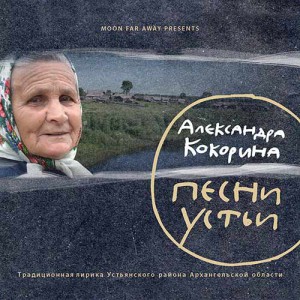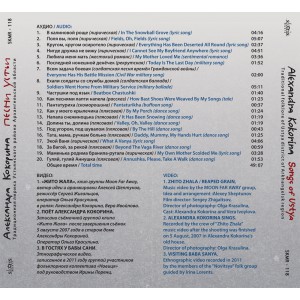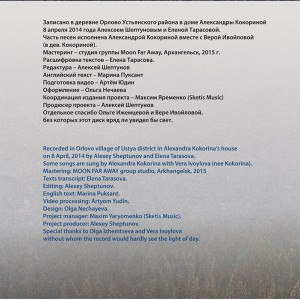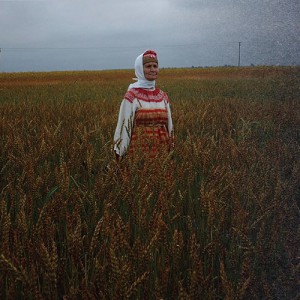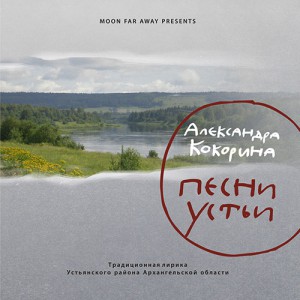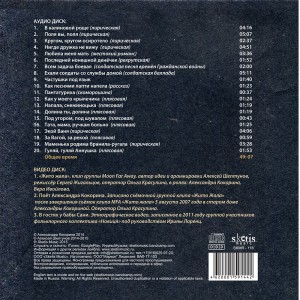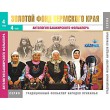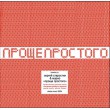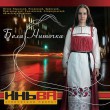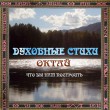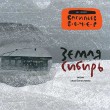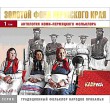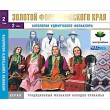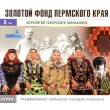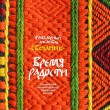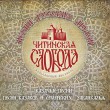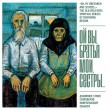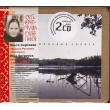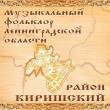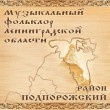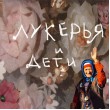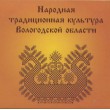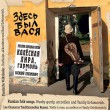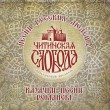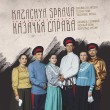- Songs of Ustya. Traditional folklor Ustyansky District of the Arkhangelsk Region (CD+DVD) (2016)
The “Songs of Ustya” album opens another side of the North Russian folk tradition. Alexandra Vasilyevna Kokorina is more than 80, and she is a very special person. She knows almost every possible song found in Ustya district of Arkhangelsk region: lyric and drawling songs, chastushkas, dance songs, circle dance songs and recruiting (military) songs. Preserving the inimitable local dialect Alexandra Kokorina is a native informant of rare proverbs, sayings and set phrases virtually lost in modern speech.
The “Songs of Ustya” album was recorded in April, 2014 in Orlovo village of Ustya district of Arkhangelsk region, in “baba Sanya’s” house; and the album preserves all her warmth and sincerity. The recording was initiated by Alexey Sheptunov, an Arkhangelsk musician, a folk researcher, a journalist, the leader of the MOON FAR AWAY neofolk group. The two-disc edition contains not only songs but a number of videos with Alexandra Vasilyevna Kokorina.
1. В калиновой роще… / In The Snowball Grove
2. Поля вы, поля…/ Fields, Oh, Fields…
3. Кругом, кругом осиротело… / Everything Has Been Deserted All Round …
4. Нигде дружка не вижу… / I Cannot See My Boyfriend Anywhere …
5. Любила меня мать… / My Mother Loved Me …
6. Последней нонешной денёчек / Today Is The Last Day
7. Всем задача боевая… / Everyone Has His Battle Mission …
8. Ехали солдаты со службы домой / Soldiers Went Home From Military Service
9. Частушки под язык / Chastushki “Pod Yazyk”
10. Как песнями лапти напела / How Bast Shoes Were Weaved By My Songs
11. Пантатуриха / Pantaturikha
12. Как у моего крылечика… / By My Porch …
13. Нападала, снежиночка… / It Has Been Snowing …
14. Долина ты, долина / Valley, Oh, Valley
16. Под угором, под шувалом… / By The Hill …
17. Тата, мама, ручкам больно… / Daddy, Mummy, My Hands Hurt …
18. Экой Ваня / What A Vanya
19. За Вагой, за рекой… / Beyond The Vaga River…
20. Маменька родима бронила-ругала… / My Own Mother Scolded Me …
21. Гуляй, гуляй Аннушка… / Annushka, Please, Take A Walk…
«A voice was heard coming o’er fields …»
Destiny brought me together with Alexandra Vasilyevna Kokorina in the summer of 2007. Back then, we decided to shoot a music video for the song “Reaping the bread” by our music project MOON FAR AWAY in the countryside. We wanted amateur actors and the great outdoors. The idea was that we wanted the video to feature a northern Russian village, a field full of ears of corn ready for harvesting, and two women appearing against these backgrounds, a young woman and an older woman. Or, rather, the former woman would turn into the latter, showing the inevitable course of historical time. The younger woman we chose to be Vera Ivoylova (Sukhanova), I knew her from the time when we both participated in a traditional music group Slavutnitsa and other folklore endeavors. It was she who told us where to “take the baboushka”, introducing to us her dear and venerated older friend who was in reality her teacher of traditional singing, Alexandra Vasilyevna Kokorina. Vera and Auntie Sanya, (or Baba Sanya, the endearment term we immediately developed for her in the music video crew) were really close friends despite the age gap. They were united by their love of their homeland of Ustya and her songs. Vera was lucky to have a teacher as kind and wise as Alexandra, a seemingly bottomless source of treasures of local oral tradition. While Baba Sanya obtained in Vera a devoted, attentive and talented student, someone to carry on this important and priceless luggage further, and to hand it over to the generations to come.
It was on August 3rd when our mobile shooting crew (director Sergey Zhigaltsov, Olga Krasulina with the camera, and me) on board the train bound from Arkhangelsk to Kotlas, arrived at the tiny station of Kostylevo, Ustyansky Region. This land is the southern border of Arkhangelsk Oblast. It looked very different from more northerly places near Arkhangelsk, that are more well-known to folklore collectors for their own mighty epic and singing traditions, as Pomorye, Pinega, Mezen etc.
Ustyany take their name from the beautiful river of Ustya, tributary to the River Vaga. This southern part of Arkhangelsk Oblast used to be a part of Vologda Governorate. Forests rich in Nature’s gifts, vast plains and magnificent hills, the picturesque winding course of the Ustya River embroidered with multiple tiny suspension bridges; all of it constitutes the natural portrait of the Ustyansky Region. And we were on our way to meet the personification of its tradition, the incarnated symbol of the singing soul of this land, Baba Sanya.
Alexandra Vasilyevna Kokorina (née Molchanova) was born on March 21, 1934 in the village of Plashnoye in Ustyansky Region. Probably no-one from her generation could call their lives simple or quiet. As she tells about it laughing,
I was seven when the war started. We were left but with my momka all alone, mom losing her health, me like this small. Gotta work, gotta make firewood, gotta do everything. It was then when I had to do it all, I started working real hard. Oy, it was hard. I had to carry on, I could carry on through the whole wartime. But look, you see, I am still alive, ah?
Her home village of Plashnoye, now extinct, used to be near the modern village of Orlovo. She started to work early, doing farm work, got married, moved to Shangaly, returned to Orlovo, then her husband suddenly died… She bore seven children in her lifetime. And she sang countless songs to her neighbors and guests. Today’s dwellers of Ustyansky region and the guests of Orlovo still have the luck of hearing her songs live. For several years Alexandra has been the lead singer of the Katyusha, the local choir residing in the village museum, “Lomonos’ Residence”. Here, her songs are highly valued, and no important event goes without her.
However, with the years, singers have been getting older and their voices weaker, and the keepers of the great oral heritage of the past have been leaving us one by one. It is great when there are people who can receive instruction from them, or at least make a recording. But it does not happen as often as it should. We seem to think that these people are here to stay and definitive action can be postponed. I am still sorry I never recorded my own grandmother singing…
This is why we, here and now, must at the very least document their voices and their songs for ourselves and for the generations to come. Thanks to modern technology we can do it with some quality, and preserving the atmosphere of a village hut where these masterpieces of folk culture were born. This is why we decided to skip all the editing of these, so to say, field recordings. You can hear the songs of Ustya just as they came.
We can only thank our good luck that we chanced to hear these songs and later, in April 2014, to come to Orlovo on purpose and record these songs using a portable recording studio. It took practically just one day, as Alexandra had been waiting for us, getting ready to sing everything she kept in her heart. At a certain stage Vera Ivoylova joined her to sing together. Her participation helps to present the folk masterpieces in their polyphonic beauty while preserving their authencity and depth. Much younger than Alexandra, Vera had been born there as well and had learned her songs from Alexandra herself. She remembered their lyrics much better than Alexandra. In the liner notes her additions are given in italics, so that their original meaning is easier to understand.
There is one song that stands out among those Alexandra sings. It is a soldiers’ song, one of her favorites, To all a combat task. It was, according to Baba Sanya, brought to the village by the soldiers getting back from World War 2. “I was grasping everything, my memory, it was good, wherever someone would a-sing, I was there”, she told us. In the village life after the war this song has surprisingly never been forgotten, has not become a nostalgic memory of the military service and the war, sung by older men. It acquired a new life as a song motivating farm workers.
“We went to haymaking, all the guys nod off as they want to sleep, at seven in the morning, and the work finishes at nine in the evening, it is a long day. So we came and we were walking along the road and while we are walking past, I say ‘Guys, let me sing you a song, since you are slumbering’ – ‘Which one are you going to sing?’ – ‘Just let me’, and so I went on with ‘Hey, March like this! Commander, let us have a machine gun, let us have a battery so we have fun’” – and Alexandra rises, almost jumps up on her feet to show how on hearing the song the haymakers started to move boldly.
What we know about this song is that it was popular during the Civil War and after it. But we do not know other full versions of it lyrics, just tiny bits mentioned by authors writing about the war. It was sung during WW2 as well, and this is how it is featured in “Two Comrades Served” (1968), a popular film about the war, and by writer Konstantin Simonov, himself a war veteran, in his novel “The Last Summer”:
“Do what you have to! Just like in that old soldiers’ song: ‘Everyone should perform their military task, should keep communication over the front, hear and see what is ahead!”I was taught this song by an old chap from transportation unit, born in 1890. It has more good instruction: ‘If you’re wounded and it really hurts, your particular inform, move a little to the back and by yourself put on a bandage … Do not ever leave your rifle to anyone’”—Ilyin was smiling for the first time as he chanted it.
One more soldiers’ song Baba Sanya sings is Soldiers coming back home from the service, which upon Mikhail Lurye has roots in literary tradition. It is very widespread in Arkhangel Oblast. The song about the military draft, The Last of These Days, is more characteristic of the neighboring Vologda Oblast. Another Baba Sasha’s song popular across the Vologda Oblast was “My mother loved and cherished me”. It is a very picturesque “city ballad” or “cruel ballad”, full of precise realistic details. Take the suicide of the heroine of the song alone: she would sing how she kills herself by a solution made of sulphur from some sulphur matches. Baba Sasha was so emotionally involved that she originally tried to skip singing the finale of the song. We also recorded some of her chastushkas (ditties made for current minor occasions, a tradition thought to originate fairly recently) and an amusing fragment of a skomoroshina (medieval comedy) called Pantaturikha. Mort of Alexandra Kokorina’s repertoire, however, are the romantic ballads and dance songs that were the staple of Ustyany village life immediately before and during the Soviet Union.
Even Alexandra’s manner of speech, something that is almost lost in the region, is so musical, that we included her story How I used my songs to get bast shoes, in this CD.
We wish Alexandra good health, and her songs to have many years ahead, as they do not deserve to become a forgotten archive material or a well-preserved but dead museum article. The living energy, and the wealth of imagery contained in these authorless masterpieces, the quintessence of Northern soul, may extend to serve many generations to come.
Alexey Sheptunov


